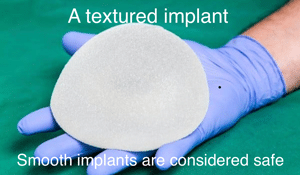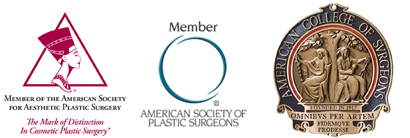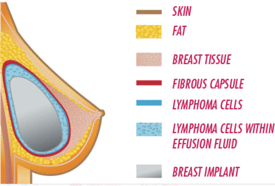Philadelphia, PA

BIA-ALCL is a rare lymphoma or cancer of immune cells. It is not an actual breast cancer but one of the immune system. It develops in the tissue around textured beast implants, and so many people think of it as a breast cancer. This is a technical medical distinction. It is very rare and highly treatable. The cancer was first associated with implants by the World Health Association (WHO) in 2011. The WHO reports this cancer as a T-cell lymphoma. It is a type of non-hodgkins lymphoma or immune cancer.
It occurs with textured silicone or textured saline implants. It is related to the surface of the implant which is called the shell. It is not related to what is inside the implant, either silicone or saline. Studies show it is not related to smooth implants, and so these are considered safe. This is excellent news for those considering breast implants or have smooth breast implants. There are two main implant manufacturers. They are Mentor and Allergan. The company Allergan used to be called Mcghan. The vast majority of the problems were with Allergan implants and not the Mentor company. This is more good news for me as I basically only use smooth Mentor implants.
Many people think this is just for silicone implants. But the medical literature shows it can occur with saline or silicone implants. This implies and supports the understanding that it is a reaction to the textured surface of the shell or covering. The irregular nature of the textured surface is causing in some unknown way the immune cancer. This development is, once again, very rare.
In July 2019 the FDA reported 573 medical device reports or (MDR) related to BIA-ALCL. There have been multiple millions of patients with breast augmentation. This again shows the extremely small number of people with this condition. The low number of reports emphasizes its rarity but does not mean it is not important. The average age of a person with BIA-ALCL is 53 years old. Textured implants are actually not frequently used by plastic surgeons. Only 5% of all implants used are textured. The textured ones are mainly used by reconstructive plastic surgeons. The Allergan company called the implants Natrelle and the surface was titled Biocell.
Click here to view a New York Times article on Breast Implants being recalled due to a link to a rare form of cancer.
This type of textured implant was used, as mentioned above, mainly for reconstructive breast surgery or for breast cancer reconstruction. Some cosmetic surgery doctors would use the surface for shaped, anatomic, or tear dropped shapes. Studies showed that this surface also had problems with increased risks of rippling or palpability. This means they were more easy to see or feel through the skin. The shaped appearance of the implants did not lead to more natural shapes as hoped or as designed. Natural shapes typically come from picking natural sizes and not large or fake sizes. All these factors put together probably mean the textured surface will never be used again. I never believed it was a good surface and always felt it had more problems than benefits.
BIA-ALCL can present in a women in many ways. The most common ways it is diagnosed or found is breast swelling, increased size, lumps, redness, scar tissue, and pain. The classic time frame for diagnosis is 8-10 years after breast augmentation. But it can present much earlier or later. If you are having problems, see your doctor immediately. After the physical exam, diagnostic tests usually include mammogram, ultrasound, and MRI.
The studies are looking for fluid or a mass. These findings may be indicative of BIA-ALCL. In this situation, testing will be done with needle drainage or aspiration. Or a biopsy will be performed. The testing will also look for CD-30 immune staining. This is a cell membrane protein that is a critical part of the diagnosis.
In the rare and unfortunate situation where the studies are positive, an oncologist will be an essential part of your treatment team. A Pet scan may be done to establish if the cancer has spread. Surgery is the main treatment. The operation is predominantly implant removal and complete capsulectomy. Some patients will need chemotherapy. Radiation therapy is not commonly done. The cancer is actually highly curable. Early diagnosis is always important.
Currently, the FDA does not recommend surgical treatment if you have textured breast implants and no symptoms. This might be an anxiety provoking situation for some women. The risk of the cancer is so rare that surgery is only done if you develop problems. The implants are not routinely taken out to prevent the cancer from developing. However, if a women wanted to have this done to be safe, I would recommend implant removal or explant and complete capsulectomy. This would most likely reduce the risk of getting the cancer to as close to zero as possible. New smooth breast implants could also be placed to maintain shape and fullness.
I am a board certified plastic surgeon specializing in breast augmentation and also explant surgery. Please call the office and come in for a consultation. I will review your options, surgery, recovery, and risks in detail.


